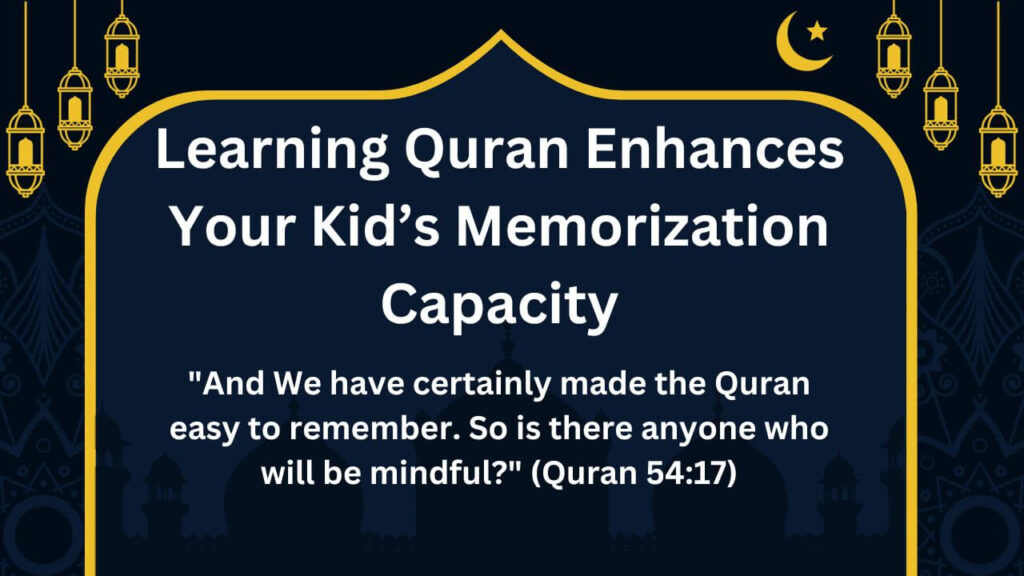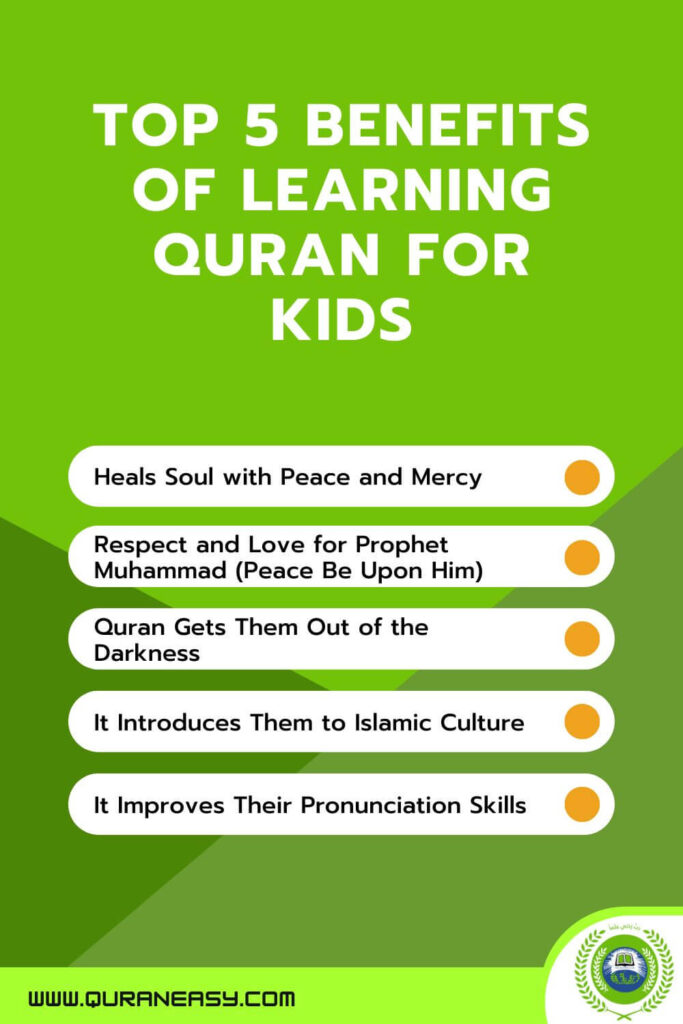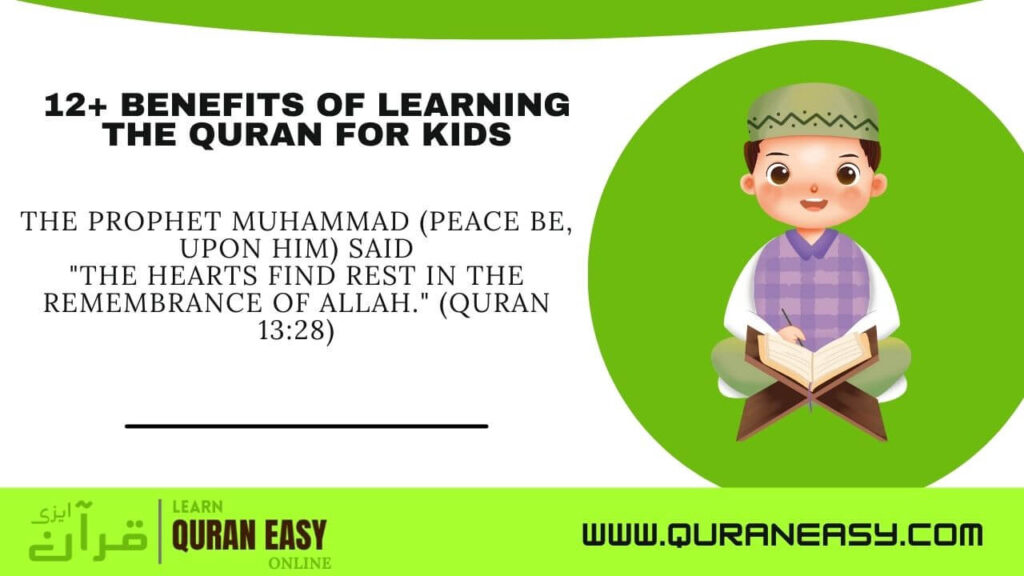The Quran, the holy book of Islam, holds a special place in the hearts of Muslims worldwide. It is not only a source of spiritual guidance for adults but also a profound learning tool for children. Teaching the Quran to kids is a noble endeavor with numerous benefits that go beyond religious education.
In this article, I will explore the many advantages of introducing children to the Quran, in the lights of Hadiths (sayings and actions of the Prophet Muhammad ﷺ) and Quranic verses.
Benefits of Learning the Quran for Kids
Teaching the Quran to children is like planting the seeds of wisdom, compassion, and character from a young age.
It’s a journey that not only connects them to their faith but also equips them with valuable life skills, such as critical thinking, discipline, and the ability to navigate challenges. Ultimately, it guides them toward a path of inner peace and a fulfilling, purposeful life.
Heals Their Soul with Peace and Mercy
The Prophet Muhammad ﷺ said,
“The hearts find rest in the remembrance of Allah.” (Quran 13:28)
The Quran is a source of spiritual solace and tranquility. Teaching it to children instills a sense of peace and mercy in their hearts. It allows them to develop a connection with their Creator and find serenity in His remembrance.
Learning the Quran helps children find serenity in the remembrance of Allah, nurturing their spiritual well-being. It instills a sense of peace and mercy in their hearts, allowing them to connect with their Creator and experience the tranquility that comes from this connection.

What are the Advantages of learning Quran for kids?

How kids can benefit from learning Quran?
Respect and Love for Our Prophet Muhammad ﷺ
The Prophet Muhammad ﷺ said,
“None of you has faith until he loves for his brother what he loves for himself.” (Sahih al-Bukhari)
Learning the Quran also fosters love and respect for Prophet Muhammad ﷺ. It helps children understand his teachings and life, creating a strong bond with the final messenger of Islam.
This connection with the Prophet Muhammad ﷺ not only instills love and respect but also serves as a model for children to emulate his exemplary character and actions. It guides them towards embodying the moral virtues and principles he exemplified, such as compassion, honesty, and kindness.
By learning about the life and teachings of the Prophet Muhammad ﷺ through the Quran, children develop a profound understanding of the Prophet’s role as a source of guidance for the Muslim community. This understanding strengthens their faith, aligns their moral compass, and encourages them to follow in his footsteps, contributing to their personal and spiritual development.
Learn a Lot from the Narratives of the Prophets and Messengers of Allah
ALLAH mentions in Quran:
“We narrate to you the best of narratives, by revealing this Quran to you.” (Quran 12:3)
The Quran contains stories of various prophets and messengers sent by Allah, offering valuable life lessons. Teaching these narratives to children allows them to learn from the experiences of these noble figures, helping them make better choices and decisions in life based on the wisdom shared in these stories.
These narratives of the prophets and messengers, as highlighted in Quran 12:3, provide children with a unique opportunity to gain insights into how faith, resilience, and steadfastness in the face of adversity can lead to success and triumph.
By drawing lessons from these stories, children are equipped with the wisdom to navigate the challenges of life, make ethical decisions, and build a strong moral foundation for their future.
Quran Gets Them Out of the Darkness
What ALLAH says in the Holy Book:
“Allah is the ally of those who believe. He brings them out from darknesses into the light.” (Quran 2:257)
The Quran is a guiding light that leads children away from ignorance and darkness, helping them navigate life’s challenges with wisdom and faith.
The holy book serves as a source of enlightenment and guidance, dispelling the darkness of ignorance, doubt, and moral confusion. It equips children with the spiritual and ethical tools to confront the challenges and complexities of life with resilience, wisdom, and unwavering faith.
It Introduces Them to Islamic Culture
The Prophet Muhammad ﷺ said,
“Whoever does not show mercy to our young or respect our elders is not one of us.” (Sunan Ibn Majah)
Teaching the Quran exposes children to Islamic culture, fostering respect for their heritage and instilling the values and traditions of their religion.
By introducing children to Islamic culture through the teachings of the Quran, they gain a profound understanding of the customs, rituals, and history that shape their identity as Muslims.
This exposure instills a sense of pride and belonging, strengthening their connection to the larger Muslim community and promoting a rich cultural heritage that emphasizes compassion, community, and a deep appreciation for the diversity within Islam.
It encourages children to carry forward the legacy of Islamic culture with respect and reverence for their elders and a caring attitude towards the younger generation, thus fostering unity and cohesion within the community.
It Improves Their Pronunciation Skills
Learning to recite the Quran accurately improves a child’s pronunciation skills. It requires them to enunciate Arabic words correctly, enhancing their language and articulation abilities.
Moreover, the precision required in reciting the Quran not only enhances pronunciation skills but also fosters a deeper appreciation for the beauty and intricacy of the Arabic language.
This linguistic proficiency can extend beyond religious contexts, benefiting children in thei
r language studies and promoting effective communication skills.
It also enables them to better understand the meaning and nuances of the Quranic verses, contributing to a more profound connection with their faith and its message.
Paves Your Way to Heaven
“But those who believe and do righteous deeds – those are the companions of Paradise; they will abide therein eternally.” (Quran 2:82)
Teaching the Quran to kids is a means of earning immense rewards in the hereafter, as it is an essential step towards righteousness and a path to heaven.
By teaching the Quran to children and nurturing their faith from a young age, it lays the foundation for a lifetime of righteous actions and devotion. The Quranic teachings guide them towards moral excellence and good deeds, increasing their chances of being among the “companions of Paradise.”
This virtuous path not only ensures a hopeful hereafter but also inspires them to contribute positively to the well-being of society and humanity, making the world a better place.
Reading Quran Guards You on the Day of Resurrection
The Prophet Muhammad ﷺ said,
“Read the Quran, for it will come as an intercessor for its reciters on the Day of Resurrection.” (Sahih Muslim)
The Quran serves as an intercessor on the Day of Resurrection, attesting to the importance of teaching it to children for their future protection.
This profound Hadith underscores the significance of imparting Quranic knowledge to children, as it not only enriches their present lives but also secures their spiritual protection in the afterlife.
Help Them Develop Critical Thinking
Teaching the Quran encourages children to think critically. It prompts them to ponder over its verses, fostering analytical and reasoning skills.
Furthermore, encouraging children to think critically about the Quranic verses empowers them with the ability to explore profound questions, seek knowledge, and evaluate information.
This analytical approach extends beyond religious studies and benefits their overall cognitive development, enabling them to make informed decisions, solve complex problems, and engage in thoughtful, open-minded discussions. In nurturing critical thinking, the Quran becomes a source of both spiritual guidance and intellectual growth.
Enhance Their Memorization Capacity
ALLAH SWT say in Quran:
“And We have certainly made the Quran easy to remember. So is there anyone who will be mindful?” (Quran 54:17)
Learning the Quran encourages memorization, improving a child’s memory and cognitive abilities.
The Quranic emphasis on its ease of memorization aligns with its inherent structure, making it accessible for children to commit to memory. This memorization process not only strengthens their cognitive abilities but also cultivates discipline, patience, and the value of consistent effort.
These skills can extend to their academic pursuits and daily life, enhancing their overall capacity to learn and retain information while fostering a strong connection with their faith.
Increase Their Sense of Belonging
The Quran instills a strong sense of belonging to the Muslim community, connecting children to their faith and its broader global community.
This sense of belonging nurtured through the Quran is essential for a child’s emotional and social development. It fosters a connection to a worldwide community of Muslims, creating a shared identity and a network of support.
It helps children understand that they are part of a larger ummah (community) with shared values, beliefs, and a sense of unity, promoting a deep sense of belonging and a commitment to the welfare of fellow believers.
Help Them Grow Spiritually
Teaching the Quran nurtures spiritual growth in children, deepening their connection with Allah and their understanding of their purpose in life.
As children engage with the Quran, they embark on a spiritual journey that allows them to explore their faith on a deeper level. This connection with Allah through the Quran helps them build a strong foundation for moral and ethical principles, instilling in them a profound sense of purpose and a heightened awareness of their role in serving humanity.
Ultimately, the Quran guides them towards a fulfilling and spiritually enriched life, fostering inner peace and a stronger bond with their Creator.
Increase Self-Discipline and Focus
The Prophet Muhammad ﷺ said, “The strong believer is better and more beloved to Allah than the weak believer.” (Sahih Muslim)
Studying the Quran requires discipline and focus, which in turn strengthens a child’s faith and character.
Furthermore, the discipline and focus required for Quranic study instill a sense of dedication and commitment in children. This not only strengthens their faith but also shapes their character by fostering virtues such as patience, perseverance, and resilience.
These qualities, developed through Quranic learning, serve as valuable life skills, enabling children to face challenges with determination and to stand as strong believers who are deeply cherished by Allah.
Conclusion
Teaching the Quran to kids is a sacred and beneficial undertaking, as it not only imparts religious knowledge but also enriches their lives in numerous ways. These benefits of learning the quran for kids extend from nurturing their spirituality to enhancing their cognitive and moral development. The Quran, with its timeless wisdom and guidance, serves as a beacon of light, leading children toward a life filled with purpose, love, and compassion.


